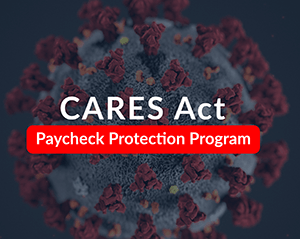PPP Loan-Funded Expenses Nondeductible If Borrower Has “Reasonable Expectation” Loan Will Be Forgiven


The Paycheck Protection Program (PPP), created by the Coronavirus Aid, Relief, and Economic Security (CARES) Act, provides for loans to individuals and businesses with the unique feature that the loans could be forgiven, under certain circumstances, to the extent that advanced funds were used to pay payroll costs, certain mortgage interest, covered rent and covered utilities (eligible expenses). In effect, a dollar of eligible expenses could result in a dollar of forgiven PPP loan. Under federal income tax rules, forgiven debts generally give rise to taxable “discharge of indebtedness income” to the borrower, but the CARES Act provided that forgiven PPP loans would be excluded from gross income of the borrower for federal income tax purposes.
From inception of the PPP loan program, practitioners were concerned that if a PPP loan were forgiven, federal income tax deductions for eligible expenses funded by the loan would be denied under one of several legal theories. Generally, under Section 265(a) of the Internal Revenue Code (Code), otherwise allowable deductions are disallowed if the expenses are allocable to a “class” of income that is either exempt from tax or excluded from income. Further, authorities hold that deductions are disallowed if the expenses are reimbursed or if there is a reasonable expectation of reimbursement or the reimbursement is foreseeable (for expenses incurred in a taxable year prior to reimbursement). The purpose of these rules is to prevent a taxpayer from obtaining a double benefit—a tax deduction linked with income that is either exempt from tax or excluded from income. Would a forgiven PPP loan, which is excluded from income by the CARES Act, give rise to such a forbidden benefit?
In IRS Notice 2020-32, released May 2, 2020, the IRS answered “yes.” Relying on Code Section 265(a)(1) and the reimbursement authorities, the IRS held that no deduction is allowed for eligible expenses that underpin PPP loan forgiveness. Disallowing deductions for eligible expenses allocable to forgiven PPP loans forestalls borrowers from enjoying that classic double tax benefit.
The Notice is silent on timing, effectively ignoring the reasonable expectation precedent and raising the question whether deductions are disallowed for eligible expenses paid or incurred in a taxable year if forgiveness occurs after the end of that year. Under Small Business Administration guidelines, a PPP loan borrower is required to apply to its lender for loan forgiveness. The process takes time, and some borrowers may be denied forgiveness. So what happens if a PPP loan is outstanding at the end of a taxable year, the taxpayer has paid or incurred qualified expenses in that year and the taxpayer either has, or has not, applied for forgiveness of the PPP loan by the end of the year?
In Rev. Rul. 2020-27, released November 18, 2020, the IRS held that deductions for eligible expenses will be disallowed if the borrower has a reasonable expectation that its PPP loan will be forgiven based on eligible expenses paid or incurred during the taxable year, whether or not the taxpayer has submitted an application for forgiveness by the end of the taxable year.
Accompanying the Ruling was Rev. Proc. 2020-51, which provides a safe harbor for taxpayers to claim deductions for eligible expenses funded by a PPP loan. The eligible expenses will be deductible if (i) the taxpayer paid or incurred eligible expenses in its 2020 taxable year for which no deduction was permitted under the “reasonable expectation” rule, (ii) the taxpayer requested, or intended to request, forgiveness by the end of its 2020 taxable year and (iii) in a subsequent taxable year, either (A) forgiveness was denied in whole or in part or (B) the taxpayer irrevocably decides not to seek forgiveness in whole or in part (including withdrawing its request for forgiveness). The Revenue Procedure provides guidelines for a taxpayer to seek relief on an originally filed return, an amended return or administrative adjustment request.
The IRS may not have the last word. In response to the IRS pronouncements, Senate Finance Committee Chairman Chuck Grassley (R-Iowa) and Ranking Member Ron Wyden (D-Ore.) issued a joint statement criticizing the IRS’s central position that eligible expenses are nondeductible and the further limitations imposed by the “reasonable expectation” rule. The senators decried the IRS’s positions as contrary to congressional intent and reaffirmed their intention to reverse it in end-of-year legislation.
